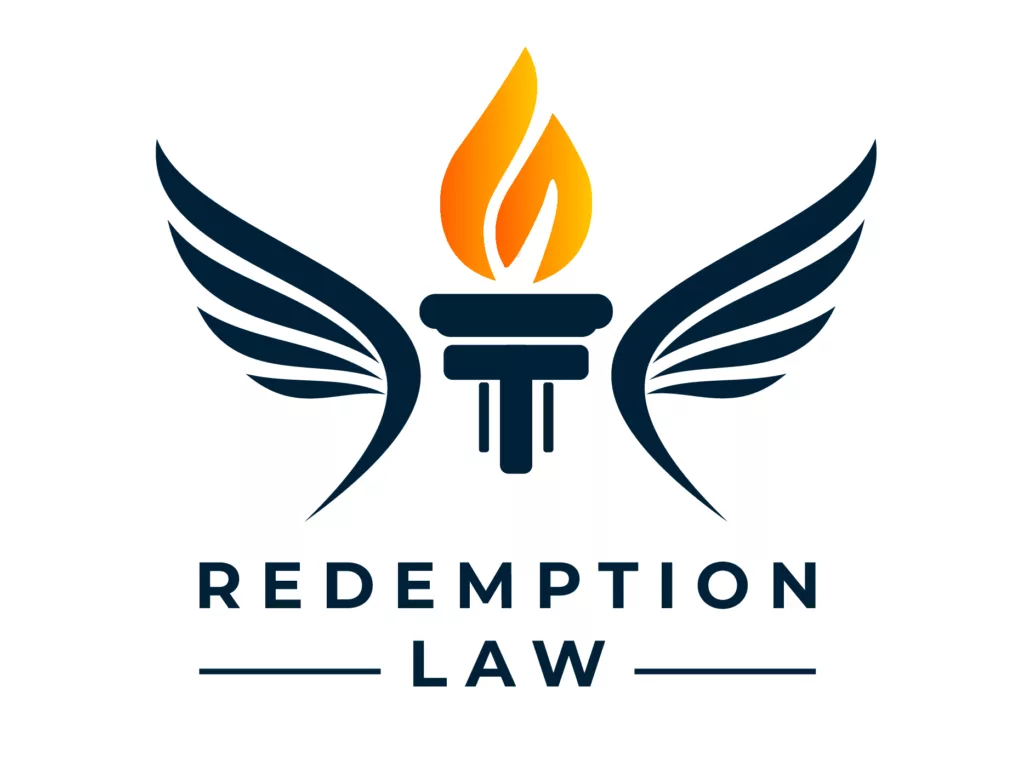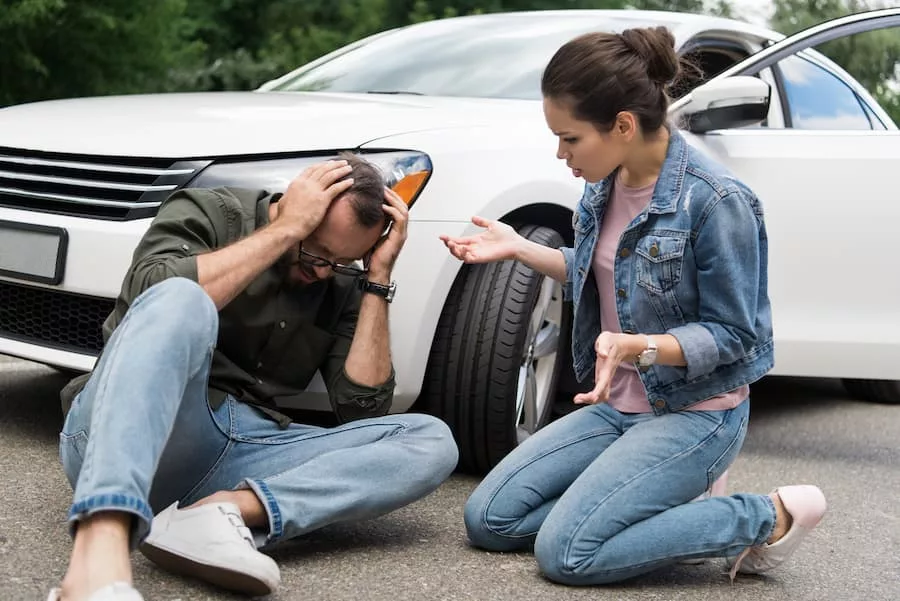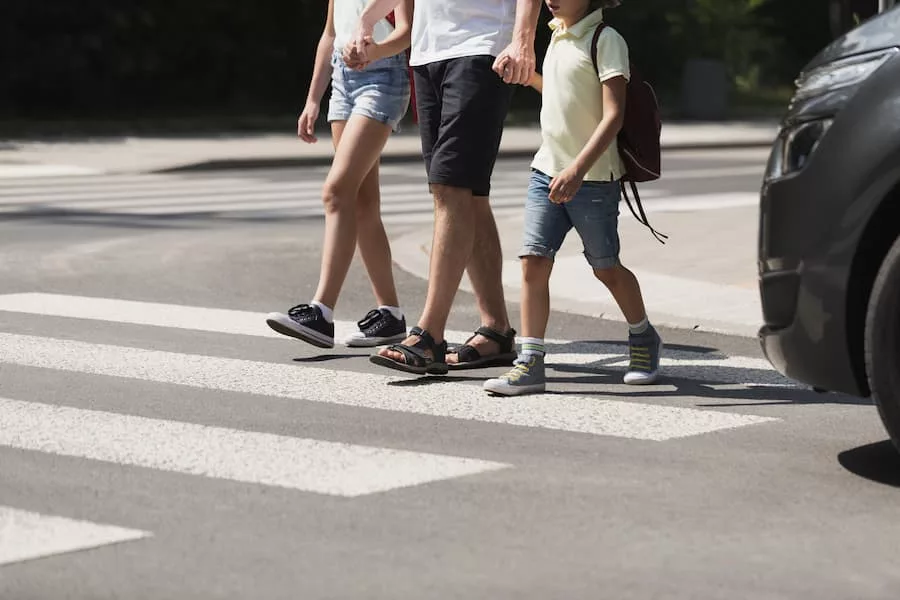Motorists are responsible for many pedestrian collisions because they behave carelessly, recklessly, or otherwise negligently behind the wheel. In some cases, though, the driver may not be solely to blame for the collision.
A pedestrian might be at least partially at fault for a car accident if they:
- Cross the road outside of a marked crosswalk when one is available
- Cross against traffic signals
- Fail to check for oncoming traffic before stepping into the roadway
- Dart into the roadway unexpectedly
- Break any other traffic law that applies to them
Pedestrians must follow Florida traffic regulations. Failing to do so could make them at least partially liable for any injuries they suffered as a result. However, motorists owe a duty to pedestrians and must yield to them when they have the right of way. Often, both the pedestrian and the motorist share fault for a given collision. And in many states, including Florida, being partially to blame for an accident does not prevent an injured pedestrian from seeking compensation from the driver. Reach out to a pedestrian accident lawyer.
Most Common Causes of Pedestrian Collisions
Drivers often cause pedestrian accidents because they act negligently behind the wheel.
Some of the most common causes of pedestrian collisions include:
- Distracted driving. Florida banned texting while driving because it creates a dangerous distraction for motorists. However, that is not the only driver distraction. Drivers changing the radio, fixing their GPS, or talking to passengers may not see a pedestrian in time to avoid hitting them.
- Failure to yield. There are many circumstances where a pedestrian has the right of way and a driver must yield to them, such as when they cross at a protected crosswalk or when the driver exits a private driveway. Failing to yield to a pedestrian with the right of way makes the driver liable for a subsequent collision.
- Aggressive driving. Drivers who tailgate, drive too fast, swerve around traffic, or otherwise drive aggressively are a threat to everyone on the road, especially pedestrians, who have nothing to protect them from the force of a collision.
- Speeding. Excessive speed is one of the top causes of collisions between vehicles and pedestrians. When drivers speed, they give themselves less stop in time to avoid a collision. In addition, breaking a traffic law meant to prevent collisions could make a driver liable for an accident.
If you suffered injuries in a pedestrian accident, you can file a third-party insurance claim or lawsuit against a driver who hit you because they failed to follow traffic laws or exercise reasonable care.
What to Do Following Your Pedestrian Collision
If a driver strikes you while you’re on foot, taking the following steps can protect your safety and legal rights:
- Seek medical attention. Likely, you’ve already sought medical attention. If not, do so immediately. Some injuries may not seem severe but can worsen if left untreated. Additionally, seeking medical treatment creates a record of your injuries and their severity, which can help your case. Furthermore, seeking care shows you take your health and your recovery seriously.
- Follow your treatment plan. You should always follow your doctor’s orders. Failing to follow the treatment plan can make your injuries worse, and the insurance company can use it against you to reduce the compensation you receive.
- Notify the insurance companies. Florida requires drivers to carry a minimum amount of insurance, including personal injury protection insurance (PIP). Policies protect drivers and members of their households, as well as any pedestrians or cyclists they hit. In other words, you could have coverage from your own PIP policy as well as the driver’s. PIP should cover 80 percent of your medical bills and 60 percent of your lost income, subject to caps and policy limits. You should get the driver’s insurance information and notify their carrier as well as your own to get a claim started.
- Consult an attorney. You should always consult an attorney after a collision. An attorney can protect your rights and pursue the compensation you deserve. They know how to gather relevant evidence, negotiate with insurance companies, and build a strong compensation claim. And while they do this, you will have the time to rest and focus on your recovery.
- Never sign anything without reviewing it. The insurance company may send you a settlement offer and request your signature. Do not sign anything without thoroughly reviewing it and consulting your attorney. Your attorney will know whether it’s a fair deal and can advise you accordingly. If it isn’t, they can negotiate for a better one and potentially take your case to court.
- Keep detailed records. Detailed records are harder to refute than fuzzy recollections. Because of this, you should hang onto any bills you receive because of your treatment or other expenses. Keep records of lost income, and write down your recollections of the accident while they’re still fresh. This evidence can help build a strong case and establish your expenses and losses.
- Create and maintain a pain journal. A pain journal or log should record your pain levels, symptoms, and experiences following your injury. It is a valuable tool when seeking pain and suffering compensation.
- Avoid social media. Posting on social media can harm your case and make it harder to recover compensation. Insurance companies and defense attorneys may monitor your social media accounts for things they can use against you. They will negatively construe even innocent posts and use them to argue that you are not as hurt as you claim. Therefore, it’s best to avoid posting on social media during your case to ensure nothing you post comes back to haunt you.
Whose Pip Coverage Applies in a Pedestrian Accident?
All Florida drivers must carry a minimum of $10,000 in PIP insurance, which covers them, the people in their car, and anyone they hit with their car, provided that person is not in a self-propelled vehicle. It also covers them if someone else hits them while they are outside their vehicle. In other words, PIP insurance extends to any pedestrian or bicyclist the policyholder strikes and also covers the policyholder if someone else strikes them.
If you have a car or live in the household of someone who does, you would start by filing a claim with this policy. If you do not, you would file your claim with the policy held by the driver who hit you.
PIP coverage compensates you for 80 percent of your medical expenses and 60 percent of your lost earnings. If you have expenses over your coverage, you could seek compensation from the at-fault driver.
As you can see, Florida’s PIP laws are complex, especially when the coverage this insurance provides is insufficient. Instead of navigating them yourself, turn to a trusted lawyer for help. An experienced attorney can review your case and help determine whether you need to file an insurance claim with the appropriate carrier.
How Can I Prove the Driver Caused a Pedestrian Crash?
Many people assume that the driver is automatically at fault for a pedestrian collision. However, this is not the case. If a driver hits you, you and your attorney must prove that they acted negligently or with reckless disregard to establish their fault.
To determine a driver’s fault in a pedestrian crash, consider:
- Duty of care. To establish fault, your attorney must show the driver owed you a duty of care to you. This is usually easy to establish because drivers must exercise reasonable care to protect other road users.
- Breach of duty. Your attorney must then show that the driver breached their duty, for example, by driving too fast or failing to yield the right of way.
- Injuries. Next, your lawyer must show that you sustained physical or financial injuries. Records of your medical treatment and proof of time missed at work can serve as valuable evidence establishing the harm you suffered.
- Causation. Your lawyer must also establish a connection between the driver’s breach of duty and your injuries. In other words, they must show that you would not have suffered your injuries but for the driver’s actions.
An experienced personal injury attorney knows how to establish fault, even in complex cases.
How to File an Insurance Claim in a Pedestrian Collision
When a driver’s negligence or disregard for safety leads to a collision that injures you, you can seek compensation through a third-party insurance claim.
A lawyer can do so by:
- Contacting the driver’s insurance company. Your attorney will start by sending a demand letter to the insurance carrier. This letter outlines the harm their policyholder caused you and the compensation you deserve. Once the insurance company receives your demand letter, they will assign an insurance adjuster to review the claim.
- Provide necessary documentation. The insurance adjuster will investigate the accident and may request additional documentation from you. These documents may include the police report, your medical records, and a detailed outline of your expenses and lost earnings. Your attorney can handle all the document requests on your behalf, so you won’t need to worry about tracking them down or ensuring they’re accurate.
- Negotiate your settlement agreement. After the insurance adjuster thoroughly reviews your claim, they will either accept your demand, deny it, or make a counteroffer. Your attorney will negotiate for a fair settlement if the insurance adjuster does not meet your initial demand. Adjusters want to save their company money, which they do by trying to reduce the compensation they pay out. As a result, having a seasoned attorney with experience negotiating can make a massive difference in the outcome of your case.
If the insurance carrier does not make you a fair offer even after negotiations, your attorney will consider filing a lawsuit against the policyholder. Still, the vast majority of claims settle out of court.
What Compensation Can I Get for a Pedestrian Crash?
If a negligent driver hit you, you can seek compensation for your losses, including:

- Past and future medical expenses. Pedestrians have little to protect them in the event of a collision with a motor vehicle, which means they often suffer severe injuries necessitating expensive treatment. You can claim compensation for your past and future medical expenses, such as hospital bills stemming from the accident, including medication and rehabilitation.
- Lost earnings. A serious injury can keep you from working, but you should not have to pay the price of someone else’s wrongdoing. The at-fault driver could owe you compensation for the money you cannot earn, which could include wages, salary, tips, bonuses, commission, and benefits.
- Reduced earning capacity. If your injuries permanently affect your ability to work, you can seek compensation for the money you will no longer be able to earn in the future. When seeking this compensation, your attorney will demand money for the difference between your pre-injury earning ability and your post-injury earning potential.
- Home modifications. If the collision left you disabled or impaired, you might need to modify your home to live comfortably. In this case, you can seek compensation to cover the cost of your necessary home modifications.
- Vehicle modifications. Besides home modification, you may need to modify your vehicle or buy a new one to accommodate your needs. You can seek the cost of the modifications in your claim.
- Pain and suffering. Pedestrian collisions can lead to severe emotional and physical injuries. If you suffer from mental anguish or physical pain, you can seek compensation for the discomfort they cause you.
Pedestrian collisions often lead to severe injuries with debilitating consequences. You deserve compensation and justice if a driver injured you through their careless or reckless behavior.
Determining the compensation they owe you and aggressively pursuing it might prove difficult without the help of an experienced attorney, especially since Florida recently tightened the deadline for personal injury claims. Consulting an attorney can simplify this process and help compensate you for your expenses and losses.
Related articles
Related articles Related articles Related articles Related articles Related articles Related articles Related articles Related articles Related articles Related articles
Pedestrian Accident
15 May 2023
How Long Do Pedestrian Accident Claims Take To Settle?
Pedestrian Accident
12 May 2023
Can a Pedestrian Be at Fault For a Car Accident?




